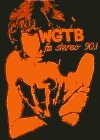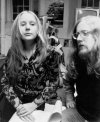
Washington
City Paper
Cover Story:
Radio Free
Georgetown
by Guy Raz
January 29
February 4
1999
 |
|
RADIO FREE GEORGETOWN
Sleeman is a case study in contradiction. At 55, he heads up the audio engineering department at United Press International. He is mild-mannered to the point of appearing timid, and he wears his hair short enough to be mistaken for a Reagan revolutionary. If you listen to his words, though, instantly it becomes clear that Sleeman is no mainstream American.
"Our generation failed to change the distribution of wealth and power," he says. "I think this country is run by a group of powerful white men." Although he is more concerned with the ordinary domestic details typical of a man his age (his retirement fund, health, and membership in the American Association of Retired Persons), Sleeman calls himself a socialist. And to this day, he remains bound to his belief in community-based alternative radio as a purely democratic medium.
He even operates a low-power AM station from the basement of his modest home in a middle-class neighborhood in Rockville. His broadcast, at 1080 AM, can be heard within three blocks. "I turn it on when I feel like it," he says. Several weeks ago, he played an epic track off the Aphrodite's Child album 666. For over 10 minutes, a woman is heard wailing in euphoria as she climaxes (twice) during sex. "I come, I come, I come," she says over and over. "This is the stuff we'd play at 3 in the afternoon [at WGTB]," Sleeman says with a chuckle.
During his time at WGTB, he became increasingly radical. But, besides having to straddle the line between station staffers and university administrators, he differed from his station comrades in that he believed the radical phalanx needed to slowly legitimize its outlook if it were ever to draw a receptive audience. He was well aware of the popular perceptions of leftists that dominated the American cultural outlook. If the station advanced its political goals solely outside the boundaries of the mainstream cultural milieu, it would never be a legitimate voice.
According to WGTB alumni, the Sleeman era was the station's golden age. Under Sleeman, WGTB introduced a gay and lesbian program called Friends, which became the longest-running gay-oriented radio program in the country. (The show went off WGTB in 1976 and moved to Pacifica Radio, where it ran until 1982.) Friends was a groundbreaking program, giving voice to what was then a largely closeted gay community (by current standards) and, as host Bruce Pennington recalls, "provid[ing] an identity for people who were still trying to find one."
Friends provided information about venereal disease and community support groups, and it challenged mainstream values, premiering, as it did, less than five years after the watershed Stonewall riot in New York, which marked the beginning of the gay liberation movement. "I talked about giving a blowjob on the air," recalls Ken Rothschild, another host. "It got to the point where I would ask guests if they swallowed." The show attracted an impressive list of regular guests, from dancer Peter Allen to filmmaker John Waters to drag-queen actors Holly Woodlawn and Divine. Allen Ginsberg and Cheech and Chong paid visits, engaging, with the staff, in their trademark forms of herbal misbehavior. The show provided analysis of songs ("Just exactly what were Paul Simon and Julio doing down by the schoolyard?" asked Pennington on one show), produced radio dramas dealing with gay issues, and fielded on-air calls from listeners. "Every show had to be pertinent and say something, because we knew we could be shut down by Georgetown any day," says Pennington.
The station's feminist contingent produced Sophie's Parlor (still heard, with different hosts, on WPFW), which played music produced and performed by women. "Our mission was to play women's music on the radio in a 'macho-rock atmosphere,'" says Doherty.
But WGTB's most significant asset was its regular music programming. While local for-profit station WHFS—and only that station—came close to playing similar music, WGTB operated under a totally free-form philosophy, with no commercial support—which meant no limitations, no playlists, and no industry pressure to broadcast any particular kind of music. "Nobody ever came into the studio saying, 'You can't do that,'" says former DJ David Selvin. "I could play Edith Piaf next to Jimmy Cliff. I would play Judy Collins singing 'Pirate Jenny' next to the Doors."
The station was responsible, in part, for introducing Britain's Canterbury Movement to American audiences, recalls DJ Steven Lorber. Bands like Gentle Giant, Caravan, Gong, and Soft Machine were almost entirely unknown to American radio listeners. "Musically, WGTB was light-years ahead of other stations. I played the Sex Pistols' 'Anarchy in the UK' the week it came out—they were an unknown band at that time."
"We played an eclectic mix of music with an urban focus," says DJ Mark Gorbulew, who also made his mark on the D.C. music scene. Gorbulew left WHFS in 1971 after a political dispute ("I publicized a rally for the Black Panthers," he says) and landed at WGTB, agreeing to bring his wildly popular radio program, Spiritus Cheese, to the station on a volunteer basis. Spiritus Cheese broadcast nightly out of Copley basement, focusing on black soul, blues, and jazz—but also on the influence of black artists on white rock. "We would feature an artist—say, Elvis Presley," recalls Gorbulew. "Then we'd play all the original versions of Elvis songs sung by black people like Muddy Waters or Chuck Berry." Gorbulew, so goes an urban legend, was also the inspiration for Marvelous Mark of Doonesbury (a legend that Doonesbury creator Garry Trudeau denies).
WGTB's music programming was influential enough that some contemporary observers believe the station was indirectly responsible for the rise of Richard Branson's Virgin Records. "We were playing the hell out of Mike Oldfield's Tubular Bells," remembers former Music Director John Paige. During the filming of 1973's The Exorcist on the Georgetown campus the movie's producers liked what they heard coming out of Copley. The eerie sounds on Tubular Bells, they decided, would suit the film perfectly. After The Exorcist proved a success at the box office, Tubular Bells sold 10 million copies. It was one of Virgin's first major releases, the album that catapulted the small company into the big leagues.
DJs like Lorber, Paige, and Selvin focused on the music. "Some guys were more interested in fucking girls," says Lorber. "I was interested in the music." Nor was the station's political mission part of their agenda. "The political people weren't really interested in the music," says Lorber. "They were interested in making political statements." Lorber sees the station's eventual demise as a result of self-righteous attitudes among the more politically inclined volunteers. "I hated what Sleeman was doing," he says. "The [news people] were flaunting political stuff."
|